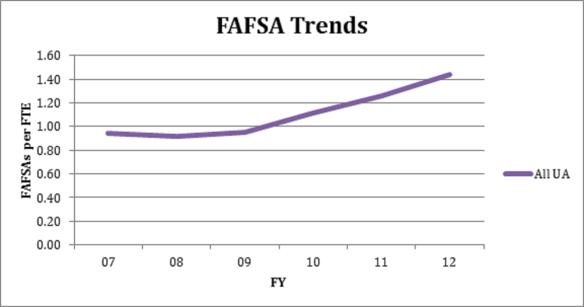1/27
University of Alaska Sees Noticeable Increase in Grant Aid to Students

University of Alaska students are filling out the Free Application for Federal Student
Aid, known as “the FAFSA,” in record numbers, resulting in a marked increase in need-based
Pell Grants awarded to Alaskans.
Pell grants at UA nearly tripled in six years, from 4,035 grants valued at $8.9 million
in 2007 to 7,848 grants valued at $25.8 million in 2012. In Alaska, more than 90 percent
of Pell grant recipients who are dependent students enroll in a four-year institution--the
highest percentage in the nation. Students currently can receive up to $5,645 a year
in Pell grants depending on family resources.
There's no doubt UA is a great value with the second-lowest resident tuition in the
country. UA President Pat Gamble and the Board of Regents have made it a priority
to minimize tuition increases while maintaining quality. In addition, the State of
Alaska is strongly committed to UA through its financial and public support.
Yet, all post-secondary job training or college still costs money. Full-time university
tuition and fees ranges between $5,200 and $7,200 a year.
The FAFSA is a UA student’s best friend, providing access to federal need-based aid
such as the Pell grant, some merit-based assistance as well as privately funded scholarships.
Increasing FAFSA participation has been a major goal since 2007. The "February FAFSA
Frenzy" (www.alaska.edu/fafsafrenzy) encourages students to fill out this form, raising awareness with drawings, contests,
fun events and workshops. Also supporting increased FAFSA submission rates are the
Alaska Commission on Post Secondary Education’s College Goal Alaska (collegegoalak.org) and UA/ACPE’s College Application Week (www.alaska.edu/studentservices/college-application-week).
“These efforts are clearly working,” said Saichi Oba, associate vice president for
students at the UA System. “Since 2007, the number of FAFSAs submitted per UA full-time
student equivalent (FTE) has increased by 53 percent. The overall number of FAFSAs
submitted increased 69 percent. UA students are increasingly recognizing the value
of the FAFSA in financing college.”
Another goal of the financial aid outreach campaign is to increase the number of FAFSAs
submitted early, between January and March. UA now receives 45 percent of FAFSAs by
the end of March, a 25 percent increase over prior years. These early students receive
early award letters. Early awarding encourages early decisions, and enables students
to connect earlier to the campus they will attend.
-30-
A graph showing FAFSA trends at UA is at www.alaska.edu/studentservices/staff/financial-aid/
For more information:
• Arthur Hussey, UA System Student Services Manager, amhusseyiii@alaska.edu or 907-450-8148
• Deanna Dieringer, University of Alaska Fairbanks, Financial Aid Office uaf-financialaid@alaska.edu or 907-474-7256
• Sonya Stein, University of Alaska Anchorage, Office of Student Financial Assistance,
financial.aid@uaa.alaska.edu or 907-786-1480
• Corinne Soltis, University of Alaska Southeast, Financial Aid Office, finaid@uas.alaska.edu or 907-796-6255
NR3-14

